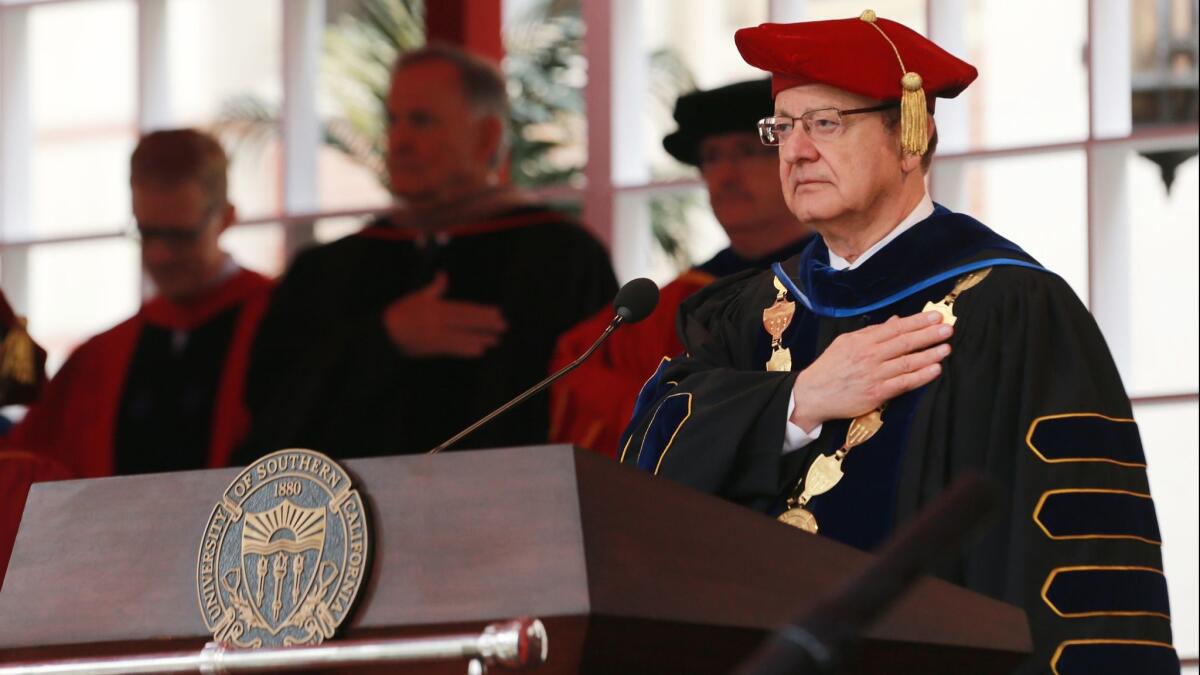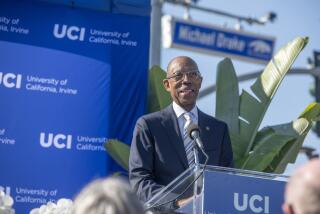Editorial: USC President Max Nikias should resign

- Share via
In the wake of two appalling scandals that have badly marred the reputation of the University of Southern California, it is time for President C.L. Max Nikias to step aside or be ousted.
Almost a year after the shocking revelation that the dean of the medical school was doing drugs and partying with young criminals and addicts — and a week after the revelation that a gynecologist at the student health clinic had been repeatedly accused over several decades of making sexual comments and touching young patients inappropriately — it has become increasingly clear that Nikias is not the proper person to lead the university out of this mire. He has failed to respond forcefully or appropriately to these crises on his watch.
In the cases of both Carmen Puliafito, the medical school dean, and George Tyndall, the gynecologist, Nikias and top administrators had the opportunity to confront the misconduct head-on in a public and transparent fashion. They could have used these troubling cases to demonstrate their commitment to protecting students and patients. They could have sent a message that misconduct would not be tolerated.
Instead, USC leaders chose to cut secret deals to make the problem employees go away. They failed at first to report the doctors to the Medical Board of California, the agency responsible for protecting the public from bad physicians. They failed to notify past patients or the larger USC community until they were confronted by The Times. They didn’t arrange counseling for victims of the accused gynecologist until the revelations were about to come out. They did not alert law enforcement until they came under pressure. In a move that smacked of tragicomedy, the university actually replaced Puliafito with a new dean who had himself been formally disciplined some years earlier after an allegation that he sexually harassed a researcher. That was an indication of either an extraordinary failure in the vetting process or of mind-boggling tone-deafness.
Nikias has responded to crisis by trying to protect his brand first — rather than the at-risk members of his community.
In all three cases, Nikias and university leaders acknowledged the misconduct publicly only after reporters from The Times uncovered the secret deals, leading to the inevitable conclusion that damage control is USC’s top priority, not the protection of the students and patients.
Of course, any school the size of USC will have problem employees — sometimes even dangerous ones. But the test of a leader is how he or she responds to crisis. It was Nikias’ job to reset the university’s tone and transform its culture — and to build institutional structures — so that students and faculty could feel safe, knowing that their complaints would be heeded and addressed. We see little evidence that such cultural change is underway.
USC is a huge and extraordinarily powerful institution, the largest private employer in the city of Los Angeles. Over the years it has climbed in the national rankings of colleges and universities. Much of that has occurred under Nikias. The school has raised oodles of money, built big new buildings and expanded its offerings for its 45,000 students. But many of Nikias’ critics argue that growth has come at a steep price: that the university has sacrificed something fundamental along the way. That is the criticism implied in a letter signed by 200 faculty members this week calling for the president’s ouster and insisting that the school needs to return to its “core mission.”
Nikias had opportunities to do better. When Puliafito, a prolific fundraiser, abruptly resigned as dean in March 2016, there was no public acknowledgement that just three weeks earlier, a 21-year-old woman had overdosed in his presence in a Pasadena hotel room — even though an anonymous witness had called Nikias’ office and told two employees about the dean’s presence at the hotel. Somehow, that message didn’t get through.
Subsequently, The Times tried to present Nikias with evidence of the dean’s use of methamphetamine and other drugs. But Nikias and his staff ignored or rebuffed inquiries. Then, after the story ran, Nikias and top university leaders had the gall to say they were shocked and outraged and would fire Puliafito.
USC says Nikias didn’t learn of the Tyndall allegations until after the gynecologist had already left his job (with a financial settlement from the university). But when he did learn, he sat on the results of the investigation for months without going to the medical board or contacting past patients. That’s particularly shocking because USC had just gone through the Puliafito scandal.
Nikias has issued multiple apologies for how the university handled the Tyndall case. On Tuesday he released a 20-page “action plan” that calls for, among other things, the creation of various offices, commissions and hotlines to handle complaints of harassment and ethical violations.
But all the hotlines and commissions in the world won’t help USC fix its image as long as it is run by leaders who refuse to confront their own culpability.
Like leaders of the Catholic Church and many other institutions that have faced reputational scandals, Nikias has responded to crisis by trying to protect his brand first — rather than the at-risk members of his community. Hilary Schor, a professor of English who co-wrote this week’s letter from the faculty, said Tuesday: “The tone for the university counsel’s office, for the Department of Equity and Diversity, for department chairs and provosts is set by the president. The tone here has been cover up, conceal, deny, settle.”
That’s not the kind of leadership USC needs as it moves forward.
Follow the Opinion section on Twitter @latimesopinion and Facebook
More to Read
A cure for the common opinion
Get thought-provoking perspectives with our weekly newsletter.
You may occasionally receive promotional content from the Los Angeles Times.










